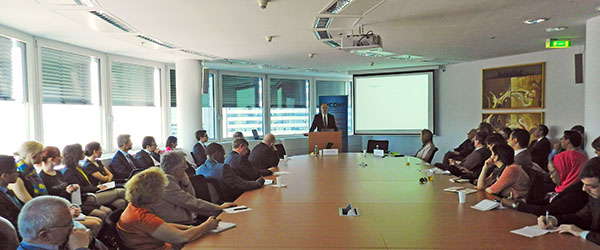

On 22 May 2014, the Vienna Center for Disarmament and Non-Proliferation (VCDNP) hosted a seminar by Ward Wilson, senior fellow and director of the Rethinking Nuclear Weapons project, entitled "Five Myths About Nuclear Weapons." VCDNP Executive Director Elena Sokova moderated the event.
Wilson began by asking a number of questions: what if nuclear weapons do not give us the security we think they do? What if nuclear deterrence does not always work? What if our widely accepted beliefs about nuclear weapons are fundamentally wrong? Most claims about nuclear weapons, he explained, are inherently psychological—and therefore unverifiable—and thus should be questioned. A lack of data on nuclear weapons and their usefulness prohibits us from producing reliable theories through simulations. What if, in reality, nuclear weapons play no significant role in international security?
Wilson then challenged the conventional wisdom that the atomic bomb led to the Japanese surrender in World War II. He argued that Japan's surrender was compelled not by the US bombings of Hiroshima and Nagasaki, but rather by the Soviet Union declaring war on Japan, as this meant that Japan would be fighting a hopeless war against two great powers on two fronts. Wilson further maintained that the Japanese military code put death before dishonor; and therefore, by spreading the myth that it was not the weakness of the Japanese military, but rather the technological advantage of the atomic bomb that led to Japan's surrender, the military could save face.
Another issue Wilson raised concerned the strategic and military value that advocates of nuclear weapons attribute to the atomic bomb. He pointed out that, after 1945, nuclear weapons were believed to be of immense value: they not only guaranteed victory in the war and subsequent negotiations, but they also bestowed prestige and ultimate security on their possessor. However, Wilson pointed to a number of historical examples that challenge these beliefs. He noted cases where states even strengthened their security in part by giving up their nuclear weapon programs, such as South Africa, Germany, and Japan, underlining the notion that in today's world, a state does not have to possess nuclear weapons to be influential. In addressing military aspects, Wilson pointed out that military officials advocate small, precision-guided weapons, not clumsy and overly large nuclear weapons: "If you want to destroy one building with a nuclear weapon, you need to destroy three-quarters of a city. If you decide to kill enemy troops with a nuclear weapon, retaliation and radiation will kill your own troops," Wilson argued.

Wilson also addressed the situation in Ukraine and resurgent claims that a nuclear-armed Ukraine would have deterred Russia's annexation of Crimea. Using maps, he illustrated how if Ukraine had attacked a Russian-occupied Crimea or tried to defend against Russia on Ukraine's eastern border with nuclear weapons, wind direction variability would have likely led to large losses of civilians in both Ukraine and Russia due to the spread of radiation. Wilson also argued that nuclear deterrence would not have changed anything because it is inherently psychological. Putin, or so Wilson maintained, understands the limitations of nuclear weapons very well, and therefore would not have been deterred by Ukraine's possession.
By continuing to use the site, you agree to the use of cookies. more information
The cookie settings on this website are set to "allow cookies" to give you the best browsing experience possible. If you continue to use this website without changing your cookie settings or you click "Accept" below then you are consenting to this.